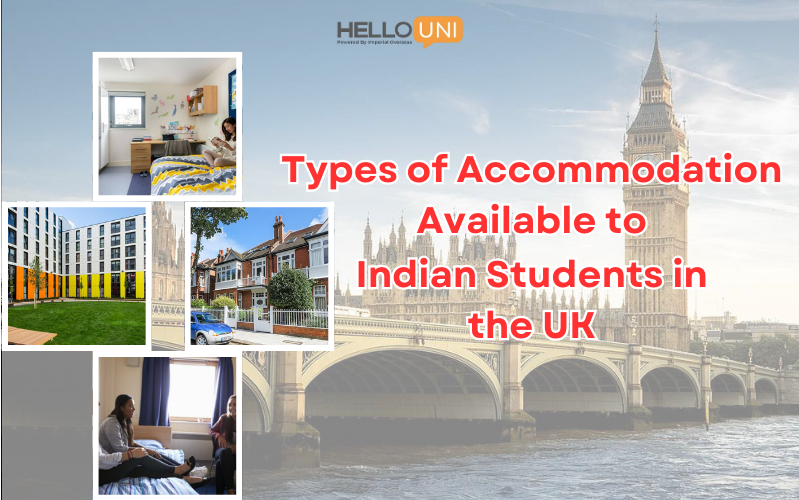When Indian students decide to study in the UK, one of the most important aspects to consider is accommodation. The type of housing you choose can significantly impact your overall experience and comfort during your time as a student. Here’s a guide to the various accommodation options available to Indian students in the UK:
1. University Halls of Residence
University-managed halls of residence are one of the most popular choices for first-year students. These accommodations are located on or near the university campus, providing easy access to classes and university facilities. Halls of residence typically offer furnished rooms, communal spaces, and support services, creating a community atmosphere where you can easily meet other students. Depending on the hall, you can choose between catered or self-catered options, giving you flexibility in managing your meals.
2. Private Student Accommodation
Private student accommodations, often run by specialized providers, are another popular option. These are similar to university halls but are privately managed. They offer a range of modern amenities, including en-suite rooms, communal areas, laundry facilities, and high-speed internet. The flexibility of private accommodations often appeals to students, with options for short-term or long-term leases depending on your study duration.
3. Shared Houses or Flats
For students who prefer more independence, renting a room in a shared house or flat is a common choice. This type of accommodation is typically more affordable than private student residences and offers more privacy. You can rent a room in a house shared with other students, where you’ll share common spaces like the kitchen and living room. This option requires more responsibility, such as managing utility bills and maintaining the property, but it can also provide a more authentic living experience.
4. Homestays
Homestays allow international students to live with British families during their time abroad. This option is perfect for those who want a taste of British culture while improving their English language skills. Such arrangements often involve meals and provide a close-knit family atmosphere, which can be comforting for those who are living away from home for the first time. However, this type of accommodation may restrict its occupants more than others.
5. Short-Term Accommodation
Some students may require short-term accommodation, especially when they first arrive in the UK. This can include staying in hostels, hotels, or temporary student housing until they find more permanent accommodation. It’s advisable to book short-term housing in advance to ensure a smooth transition.
Cost of Accommodation
In order to budget accordingly, one has to know how much rent they will be expected to pay. The price of accommodation depends on many factors like type and location. For example, some university halls of residences range from £100-£200 per week whereas private rentals could go as low as £70-£150 per week per room. On the other hand, homestays are generally cheaper but may offer fewer facilities compared with private rented accommodations. Besides the rent, you should also consider other expenses such as utilities like water and electricity bills and possibly council tax if you decide to stay in a privately rented house.
Key Considerations
When deciding on where to live during your studies, please keep the following things in mind:
- Proximity to Campus: You do not have trust funds, so avoid traveling costs by staying near the school. This is especially true now that most students’ nightlife revolves around campus both during school days and out-of-semester breaks!
- Safety and Security: Never choose a place where you can’t feel safe, from its security systems (like an entry system) to even having cameras installed within it.
- Social and Cultural Aspects: Would you rather have a whole host of new friends or become part of British culture? While homestays provide deep cultural immersion, university halls are social hotspots.
- Legal Stuff: You should be aware of your rights as a tenant before signing any contract. This involves knowing about the deposit and the landlord’s responsibilities.
- Extra Costs: Please remember, though, that it’s not just the rent; other costs, such as bills and food, must also be considered.
Looking for a place that truly feels like home in the UK? With HelloUni’s expert advice, we’ll help you find the perfect spot where your UK journey begins. Your new home will be more than just a place to stay—it’ll be where you thrive. Connect with HelloUni today, and let’s find your perfect fit.
FAQs
What are the different types of student accommodation available in the UK?
Indian students in the UK can choose between university halls of residence, private student accommodations, shared houses or flats, homestays, and short-term accommodations.
How much does student accommodation typically cost in the UK?
It depends on which type it is and where it is located. For instance, university halls cost between £ 100 and £200 per week, while private rentals fluctuate between £70 and £150 per week, with homestays being cheaper.
What factors should I consider when choosing student accommodation?
Key factors include proximity to campus, safety aspects, legal obligations regarding tenancy agreements, and additional expenses involving utilities and internet connection, among others.
What is the advantage of living in university halls of residence?
University halls offer convenience (proximity to classes) and create a feeling of one family. They give students time to adjust and take part in college life without getting lost.
Are homestays a good option for Indian students in the UK?
Homestays provide cultural immersion opportunities and improve language skills at an affordable price, making them suitable for newcomers to England.







